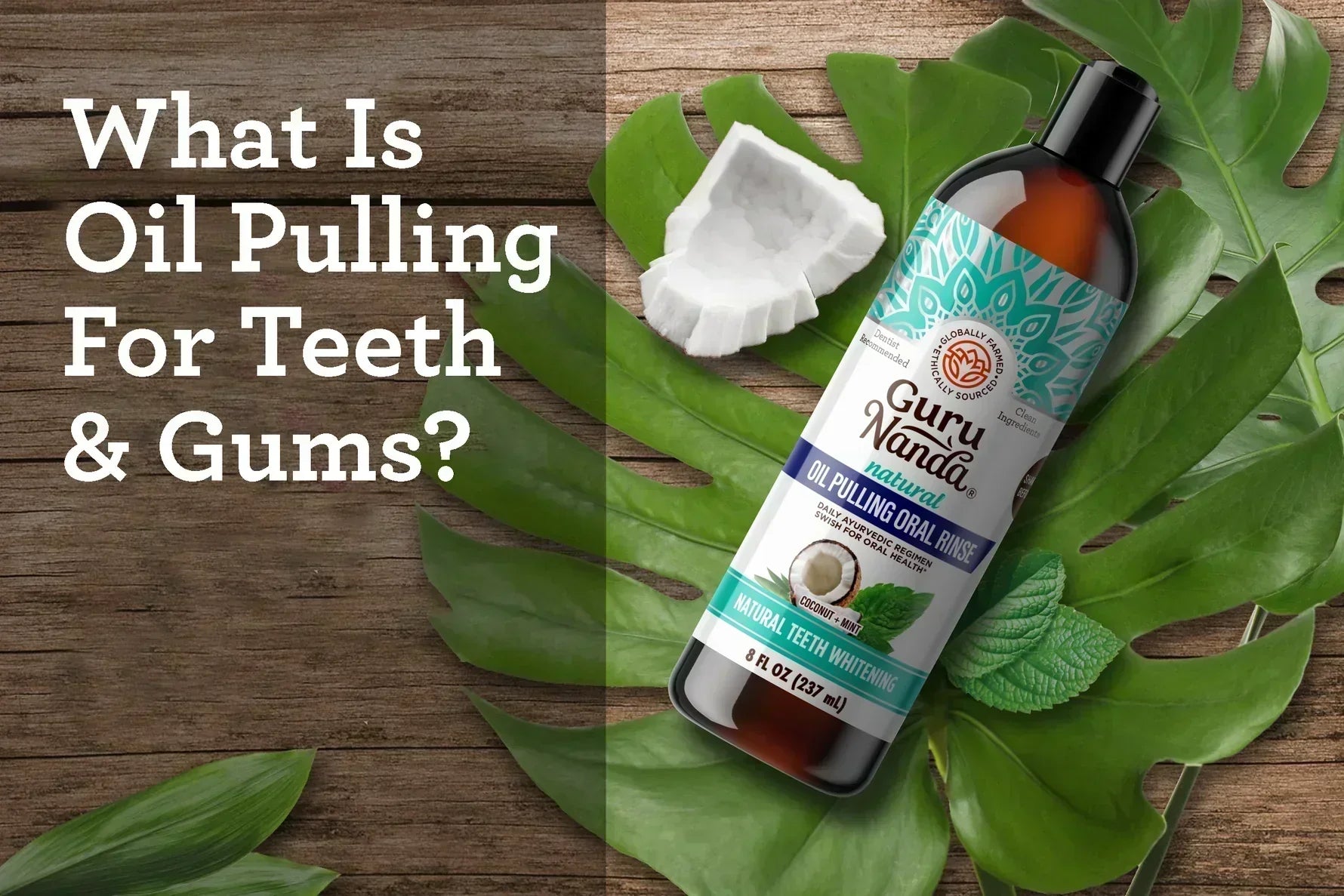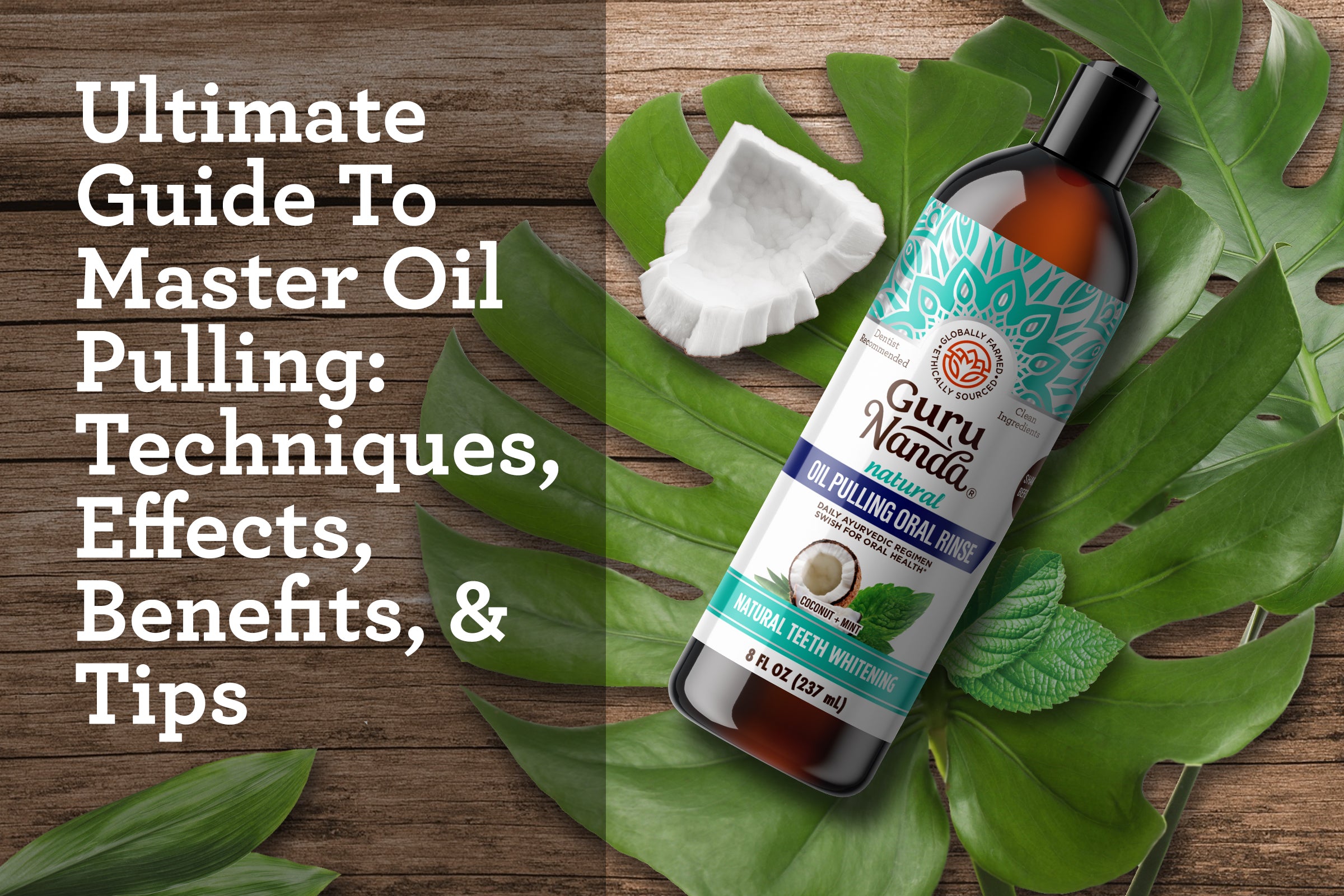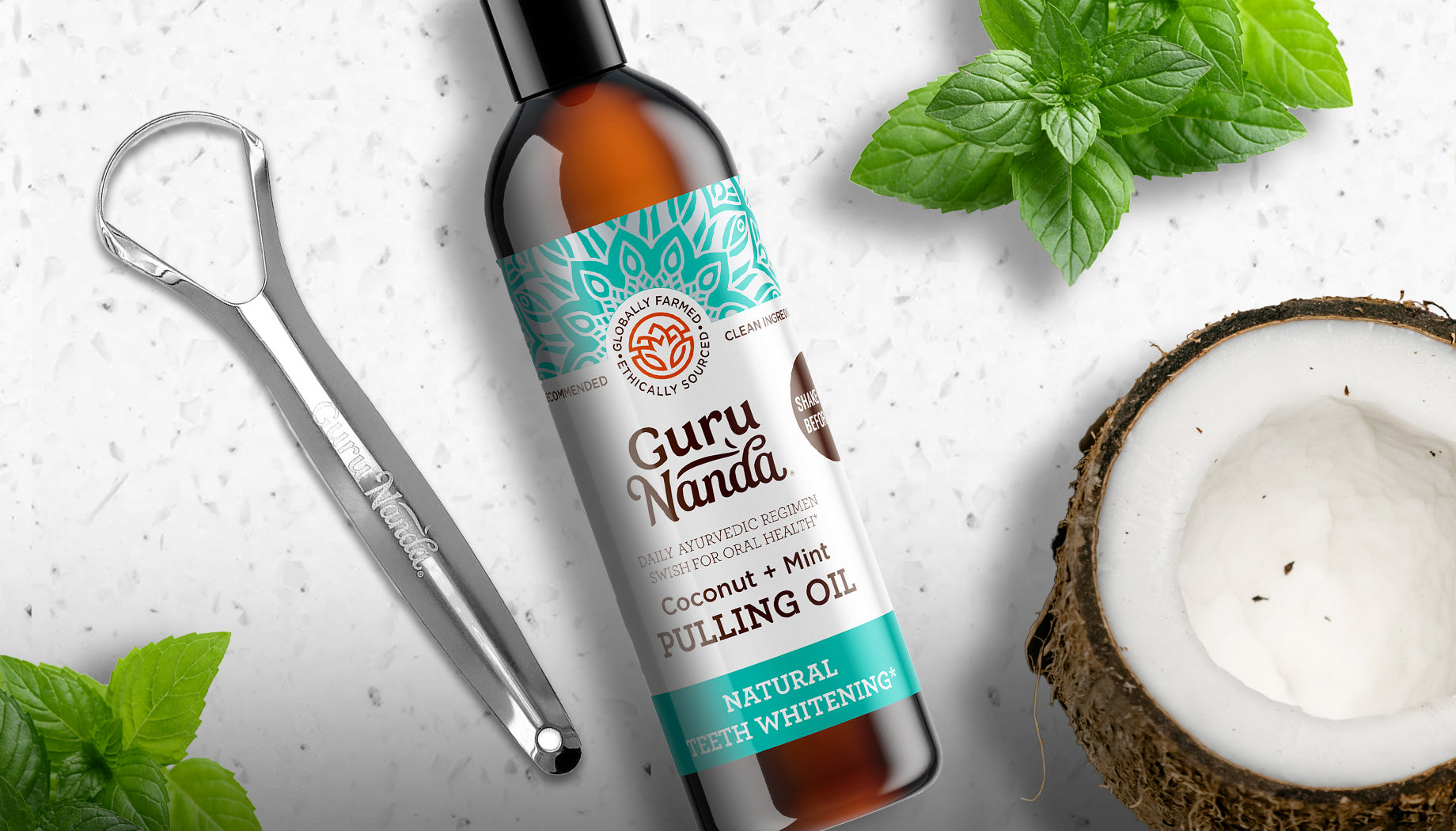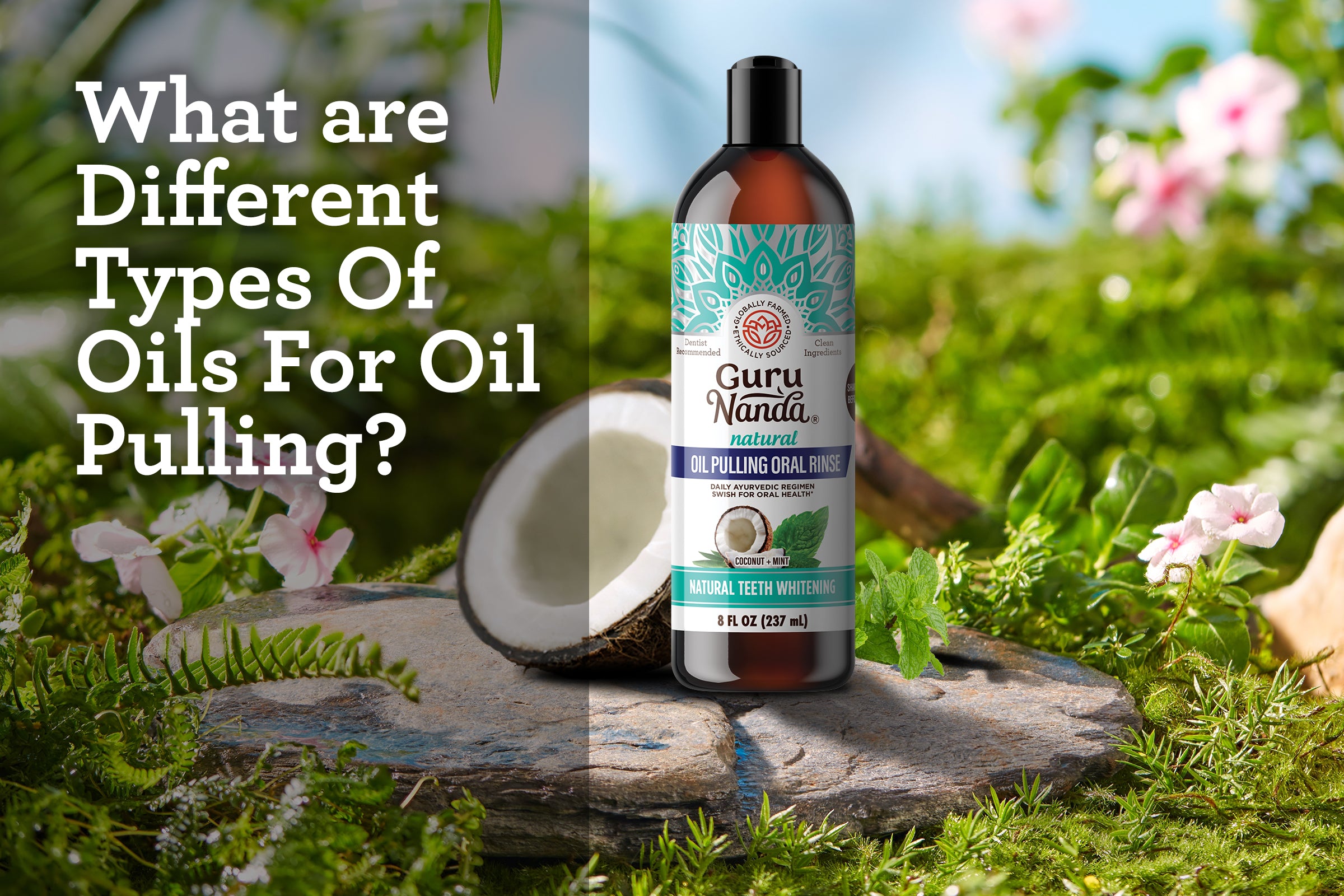- What is Oil Pulling
- What is Oil Pulling for Teeth and Gums
- How to Oil Pull
- Advantages of Oil Pulling
- Incorporating Oil Pulling Into Your Daily Oral Care Routine
- Best Oil for Oil Pulling
- Understanding the Safety and Potential Side Effects of Oil Pulling
- FAQs
- Discover the Benefits of Oil Pulling With GuruNanda Today
What Is Oil Pulling? Guide, Benefits and How To Start
Oil pulling is a simple practice that involves swishing natural oils like coconut, sesame or sunflower in your mouth. When the practice first started, it was suggested you swish for 15-20 minutes. However, GuruNanda’s formula reduces that time to 2-10 minutes. It’s a technique rooted in Ayurvedic holistic medicine, dating back approximately 3,000 to 5,000 years[1], that’s used to treat various oral health issues[2]. It’s been gaining popularity more recently as a natural complementary practice to modern oral hygiene products due to its ability to freshen your breath and support happy gums[2].
What Is Oil Pulling For Teeth and Gums?
Oil pulling is a traditional wellness practice that benefits oral health and overall well-being. Research shows that oral health is closely connected to overall health[3], with oral conditions potentially leading to systemic issues. This connection is due to shared risk factors between systemic and oral diseases because the mouth can serve as a gateway for harmful bacteria to enter the body[3][4].
Growing awareness of the oral-systemic health connection has sparked interest in alternative practices like Ayurvedic oil pulling. This ancient ritual, supported by contemporary research, offers an effective approach to fortifying oral health and, by extension, overall well-being.
How to Oil Pull
The exact mechanisms of oil pulling are not fully understood, but it is believed to clean teeth and gums and reduce plaque adhesion[5]. Oils like coconut oil contain lauric acid, which interacts with saliva to create a soap-like substance in a process called saponification[6]. This process produces compounds with antimicrobial and anti-inflammatory properties that may break down bacterial membranes and neutralize oral pathogens[7].
To experience the full benefits of oil pulling, follow these steps:
-
Start with 10 to 15 mL (1 tablespoon) of pulling oil in your mouth. GuruNanda's Pulling Oil comes with a convenient measuring cup for accuracy.
-
Swish the oil for 2 minutes if you're a beginner using GuruNanda's Pulling Oil, and gradually work up to 10 minutes as you grow more comfortable. Although traditional oil pulling practices often recommend swishing for up to 20 minutes, GuruNanda's formula of fractionated coconut oil combined with essential oils like tea tree and clove is crafted to provide an effective experience in a shorter time.
-
Spit the oil into the trash, avoiding sinks to prevent plumbing issues.
-
Brush your teeth immediately after oil pulling to help remove any impurities and debris. For a thorough clean, use a soft-bristled toothbrush like the GuruNanda Butter on Gums Toothbrush.
-
Clean your tongue with a tongue scraper, floss and rinse your mouth to complete your oral care routine.

Advantages of Oil Pulling
Here are some key benefits of oil pulling, supported by research and traditional practice:
May Help in Oral Bacteria Reduction
Oil pulling significantly reduces harmful bacteria like Streptococcus mutans, which is known for causing tooth decay[8]. Oil pulling with coconut oil has been shown to be as effective as chlorhexidine for decreasing these harmful bacteria[9].
May Help in Enhancing Gum Health
Regular practice of oil pulling reduces plaque[10] buildup and symptoms of gingivitis[11], such as gum inflammation and bleeding. A study involving 60 adolescents with gingivitis found that oil pulling with coconut oil improves gum health, as evidenced by reduced plaque[7].
May Support Detoxification
Oil pulling may support the body's detoxification process by stimulating salivary enzymes that absorb toxins, such as bacterial and environmental pollutants[2]. This can reduce harmful bacteria in the mouth and contribute to overall health.
May Enhance Overall Health
Good oral hygiene is crucial for overall health, as poor dental care can lead to more serious conditions like heart inflammation. Studies link oral hygiene to the risk of bacteremia and infective endocarditis[12]. Further research is needed to explore the connection between heart and periodontal diseases[13].
May Promote Fresher Breath
Oil pulling is equally effective as chlorhexidine mouthwash in reducing oral malodor and microorganisms causing it[14]. GuruNanda’s product-specific study, conducted with GuruNanda Oil Pulling Rinse, demonstrated the significant impact of oil pulling on improving breath freshness.
May Help in Cavity Prevention
Oil pulling may play a role in preventing cavities by reducing plaque and bacterial accumulation on tooth surfaces[15]. This effect helps protect tooth enamel and potentially prevents decay, as observed in studies indicating a decrease in oral bacterial count after oil pulling[15].
Teeth Whitening
Oil pulling is not a replacement for professional dental treatments, but studies have been conducted on products like GuruNanda that show teeth-whitening benefits. For instance, subjects who used the GuruNanda Oil Pulling Rinse for six weeks showed an average improvement of 2.6 shades on the positive side, indicating whiter teeth compared to their baseline.

Incorporating Oil Pulling Into Your Daily Oral Care Routine
For best results, make oil pulling a regular part of your morning routine before eating or drinking. When paired with brushing, flossing and tongue scraping, oil pulling adds an extra layer of protection to your oral care habits, helping to safeguard both your teeth and gums.
For those with busy schedules, oil pulling can even be done while multitasking, such as during your morning shower, preparing breakfast or as part of your mindfulness routine. Because it only requires a small amount of oil and swishing, it can easily fit into your day without disrupting your other tasks.
Consistency is key — daily oil pulling can help you experience the full range of benefits, from fresher breath to happier gums. Adding oil pulling as an extra step to your regular brushing and flossing routine offers an additional layer of care, supporting a well-rounded approach to oral health. Pair it with proper hydration and a balanced diet rich in vitamins that support oral health, and you’ve got a holistic routine that fosters long-term wellness.
Best Oil for Oil Pulling
Which type of oil you choose for pulling can depend on personal preference and the specific properties of the oil. In recent years, coconut oil has gained significant popularity.
Oil pulling with coconut oil is often chosen due to its pleasant taste, antimicrobial properties[1] and thicker consistency, which many find comfortable in the mouth. Olive oil, which is rich with antioxidants and anti-inflammatory properties[16], offers a unique taste and health benefits, making it a suitable alternative for oil pulling. Alongside coconut and sunflower oils[1], each provides distinct qualities to suit individual preferences.
Ultimately, the best oil for oil pulling is one you're comfortable using regularly and doesn't cause allergic reactions or discomfort. Consistency in the practice, regardless of the oil type, is key to experiencing the potential benefits of oil pulling.
Understanding the Safety and Potential Side Effects of Oil Pulling
Oil pulling is generally safe for daily use. However, it's important not to swallow the oil, as it can cause digestive issues like an upset stomach or diarrhea. Always dispose of the used oil in the trash and brush your teeth afterward to remove any residue.
Most studies on oil pulling involve teenagers and adults. There are no specific safety guidelines for children under 12, so adult supervision is recommended to prevent accidental ingestion. For those with allergies, start with a small amount of oil to test for reactions. Always consult healthcare professionals for personalized advice if any adverse effects occur.
FAQs
How often can you oil pull?
Daily oil pulling, especially in the morning on an empty stomach, is common and recommended. Consistency is key for noticeable results, but individual preferences and tolerances may vary. Remember, oil pulling should complement — not replace — traditional oral care practices. Be sure to brush and floss afterward to maintain a thorough and balanced oral hygiene routine.
How long should you oil pull?
The typical recommended duration for oil pulling is 15 to 20 minutes, minutes per session. Start with shorter sessions and gradually increase the time as you're comfortable. With GuruNanda’s formula of fractionated coconut oil with essential oils like tea tree and clove, a 2 to 10-minute session can suffice.
Can you do oil pulling at night?
While traditionally done in the morning, oil pulling can be performed at night. The essential factor is doing it on an empty stomach for the best results. For a night-time routine, we recommend GuruNanda’s Coconut & Cinnamon Oil Pulling Flavor + Neem & Ashwagandha, enriched with soothing ingredients like ashwagandha, neem, and turmeric to support oral wellness
How long does it take for oil pulling to work?
The timeline for noticeable benefits from oil pulling can vary. Some people may observe improvements in oral health within a few weeks, while others might take longer. It’s important to stick with the routine and don’t give up if you don’t see immediate results. The best results from oil pulling come with regular, dedicated use as part of a complete oral care routine, including brushing, tongue scraping, flossing and rinsing.
Can you eat after oil pulling?
Yes, you can eat after oil pulling. For best results, complete the full oral routine, which includes oil pulling, tongue scraping, brushing, flossing and rinsing, before consuming food. This comprehensive approach can be beneficial for your oral hygiene and overall health.
Is it safe to swallow coconut oil?
Swallowing small amounts of coconut oil is generally safe, but it's important not to swallow the oil used during oil pulling[2]. After swishing, the oil can contain bacteria and toxins[2] from your mouth. It's best to spit the oil into the trash, not the sink[2], and rinse your mouth thoroughly after oil pulling to ensure you don't ingest it.
Does oil pulling help bad breath?
Oil pulling may help reduce bad breath[2] as it targets the bacteria that primarily causes it and decreases its presence in the mouth — however, oil pulling is not a substitute for regular oral hygiene practices. GuruNanda Pulling Oils are certified to help reduce and prevent malodor.
Should you oil pull every day?
Yes, daily oil pulling is commonly practiced and considered safe, and it’s often the best way to see noticeable results. As with any new routine, individual responses can vary, so pay attention to how your mouth feels and adjust if needed. Consistency is key — stick with it, as the benefits build over time. Don’t give up too soon; with regular use, you’re likely to experience a cleaner, fresher mouth.
What does coconut oil pulling do?
Coconut oil pulling is believed to help decrease oral bacteria[7], potentially improving dental health and hygiene.
Is oil pulling safe for teeth?
Oil pulling is generally safe for teeth and can be a beneficial addition to oral hygiene routines.
Can you oil pull with vegetable oil?
While technically you can use vegetable oil for oil pulling, it is not advisable or commonly recommended, as it may not provide similar benefits as traditional oils like coconut or sesame.
Should you rinse after oil pulling?
It is recommended to rinse your mouth with water after oil pulling to remove any residual oil. Additionally, brushing your teeth after rinsing is advisable for comprehensive oral hygiene.
Where to spit oil after oil pulling?
Dispose of the used oil in a trash can instead of spitting it into the sink to avoid plumbing issues.
What is the best time to oil pull?
In the morning, before eating or drinking, is generally considered the best time for oil pulling, as it’s more effective on an empty stomach. Here’s why:
-
Fasting State: In the morning, your body is in a fasting and regenerative state, which may enhance the benefits of oil pulling.
-
Bacteria Removal: Overnight, bacteria and toxins can build up in the mouth. Oil pulling first thing in the morning helps remove these substances before they’re swallowed or spread.
-
Maximized Detoxification: On an empty stomach, the body may be more efficient at flushing out toxins, as it’s not focused on digesting food. Oil pulling in the morning takes advantage of this natural detox process, making it more effective.
-
Enhanced Freshness: Oil pulling in the morning can leave your mouth feeling cleaner and fresher throughout the day, improving your sense of wellness.
-
Habit Formation: Doing it at the same time each day, like in the morning, can help make oil pulling a regular part of your routine, making you more likely to stay consistent.
What does oil pulling do?
Oil pulling is believed to clean teeth, reduce plaque adhesion and provide antimicrobial and anti-inflammatory benefits through saponification[5][7]. Regular practice of oil pulling may reduce harmful oral bacteria, enhance gum health, support detoxification, promote fresher breath and potentially prevent cavities[2][7][8].
Should I brush my teeth after oil pulling?
Brushing teeth after oil pulling is advised to thoroughly clean and remove any remaining oil residues.
Is oil pulling a substitute for brushing and flossing?
No, oil pulling is not a replacement for brushing and flossing. Instead, it can be used in addition to your regular brushing, flossing and rinsing routine to enhance your oral hygiene.
Do I need to wait to eat or drink after practicing oil pulling?
There's no need to wait to eat or drink after oil pulling. However, rinsing your mouth is recommended before you do so.
Why does the oil become milky after spitting it out?
The oil turns milky due to emulsification and mixing with saliva, indicating the trapping of bacteria and toxins.
Is there a specific regimen I can follow every morning?
A typical morning regimen can include oil pulling followed by brushing, tongue scraping, flossing and rinsing your mouth for optimal oral and overall health.
Can you oil pull with braces?
Yes, oil pulling is safe to do while wearing braces and may even be beneficial. Studies suggest that it’s less likely to weaken the elastic components of braces compared to water[17]. For those seeking a more natural approach to oral care, oil pulling offers a mild alternative to stronger antiseptic rinses like chlorhexidine, which can cause staining[18].

Discover the Benefits of Oil Pulling With GuruNanda Today
Oil pulling, an ancient Ayurvedic practice, offers a natural approach to oral care with potential benefits, including helping to remove particles from the surface of teeth and gums, improved gum hygiene and fresher breath. GuruNanda brings this tradition into the modern world by merging it with scientific research.
Our pulling oils combine fractionated coconut oil with essential oils such as tea tree, clove and oregano, as well as added vitamins, offering a refreshing and effective oral care experience. Our remedies help you easily and confidently embrace this time-honored practice. Enriched with vitamins and free from alcohol and fluoride, our products offer a safe, effective addition to your long-term daily oral care routine.
Our farm-to-bottle approach ensures you get the full benefits of each carefully selected ingredient sourced directly from ethical farms worldwide. As a key step in our comprehensive 7-step oral wellness regime, oils empower you to take a holistic approach to oral health.
Try GuruNanda's Pulling Oil today and take a step toward becoming the guru of your own wellness.
References
-
Naseem M, Khiyani MF, Nauman H, Zafar MS, Shah AH, Khalil HS. Oil pulling and importance of traditional medicine in oral health maintenance. Int J Health Sci (Qassim). 2017 Sep-Oct;11(4):65-70. PMID: 29085271; PMCID: PMC5654187. https://pmc.ncbi.nlm.nih.gov/articles/PMC5654187/
-
Shanbhag VK. Oil pulling for maintaining oral hygiene - A review. J Tradit Complement Med. 2016 Jun 6;7(1):106-109. doi: 10.1016/j.jtcme.2016.05.004. PMID: 28053895; PMCID: PMC5198813. https://pmc.ncbi.nlm.nih.gov/articles/PMC5198813/
-
Diseases and Disorders. In: Oral Health in America: A Report of the Surgeon General. Department of Health and Human Services; p. 37. https://books.google.co.in/books?id=5n5PAQAAIAAJ&lr&pg=PA37#v=onepage&q&f=false.
-
Sheiham A, Watt RG. The common risk factor approach: a rational basis for promoting oral health. Community Dent Oral Epidemiol. 2000 Dec;28(6):399-406. doi: 10.1034/j.1600-0528.2000.028006399.x. PMID: 11106011. https://pubmed.ncbi.nlm.nih.gov/11106011/
-
Mythri, H.. Oil pulling: A traditional method on the edge of evidence. Dental Hypotheses 8(3):p 57-60, Jul–Sep 2017. | DOI: 10.4103/denthyp.denthyp_64_16. https://journals.lww.com/dhyp/fulltext/2017/08030/oil_pulling__a_traditional_method_on_the_edge_of.2.aspx
-
Boateng L, Ansong R, Owusu WB, Steiner-Asiedu M. Coconut oil and palm oil's role in nutrition, health and national development: A review. Ghana Med J. 2016 Sep;50(3):189-196. PMID: 27752194; PMCID: PMC5044790. https://pmc.ncbi.nlm.nih.gov/articles/PMC5044790/.
-
Peedikayil FC, Sreenivasan P, Narayanan A. Effect of coconut oil in plaque related gingivitis - A preliminary report. Niger Med J. 2015 Mar-Apr;56(2):143-7. doi: 10.4103/0300-1652.153406. PMID: 25838632; PMCID: PMC4382606. https://pmc.ncbi.nlm.nih.gov/articles/PMC4382606/.
-
Peng TR, Cheng HY, Wu TW, Ng BK. Effectiveness of Oil Pulling for Improving Oral Health: A Meta-Analysis. Healthcare (Basel). 2022 Oct 11;10(10):1991. doi: 10.3390/healthcare10101991. PMID: 36292438; PMCID: PMC9602184. https://pmc.ncbi.nlm.nih.gov/articles/PMC9602184/
-
Vadhana VC, Sharath A, Geethapriya PR, Vijayasankari V. Effect of sesame oil, ozonated sesame oil, and chlorhexidine mouthwash on oral health status of adolescents: A randomized controlled pilot trial. J Indian Soc Pedod Prev Dent. 2019 Oct-Dec;37(4):365-371. doi: 10.4103/JISPPD.JISPPD_244_19. PMID: 31710011. https://pubmed.ncbi.nlm.nih.gov/31710011/.
-
Nagilla J, Kulkarni S, Madupu PR, Doshi D, Bandari SR, Srilatha A. Comparative Evaluation of Antiplaque Efficacy of Coconut Oil Pulling and a Placebo, Among Dental College Students: A Randomized Controlled Trial. J Clin Diagn Res. 2017 Sep;11(9):ZC08-ZC11. doi: 10.7860/JCDR/2017/26656.10563. Epub 2017 Sep 1. PMID: 29207824; PMCID: PMC5713846. https://pmc.ncbi.nlm.nih.gov/articles/PMC5713846/.
-
Ripari F, Filippone F, Zumbo G, Covello F, Zara F, Vozza I. The Role of Coconut Oil in Treating Patients Affected by Plaque-Induced Gingivitis: A Pilot Study. Eur J Dent. 2020 Oct;14(4):558-565. doi: 10.1055/s-0040-1714194. Epub 2020 Sep 22. PMID: 32961569; PMCID: PMC7535963. https://pmc.ncbi.nlm.nih.gov/articles/PMC7535963/.
-
Lockhart PB, Brennan MT, Thornhill M, Michalowicz BS, Noll J, Bahrani-Mougeot FK, Sasser HC. Poor oral hygiene as a risk factor for infective endocarditis-related bacteremia. J Am Dent Assoc. 2009 Oct;140(10):1238-44. doi: 10.14219/jada.archive.2009.0046. PMID: 19797553; PMCID: PMC2770162. https://pmc.ncbi.nlm.nih.gov/articles/PMC2770162/.
-
Front. Cardiovasc. Med., 14 January 2021. Sec. General Cardiovascular Medicine. Volume 7 - 2020 | https://doi.org/10.3389/fcvm.2020.625579. https://www.frontiersin.org/journals/cardiovascular-medicine/articles/10.3389/fcvm.2020.625579/full.
-
Sood P, Devi M A, Narang R, V S, Makkar DK. Comparative efficacy of oil pulling and chlorhexidine on oral malodor: a randomized controlled trial. J Clin Diagn Res. 2014 Nov;8(11):ZC18-21. doi: 10.7860/JCDR/2014/9393.5112. Epub 2014 Nov 20. PMID: 25584309; PMCID: PMC4290321. https://pmc.ncbi.nlm.nih.gov/articles/PMC4290321/.
-
Asokan S, Emmadi P, Chamundeswari R. Effect of oil pulling on plaque induced gingivitis: a randomized, controlled, triple-blind study. Indian J Dent Res. 2009 Jan-Mar;20(1):47-51. doi: 10.4103/0970-9290.49067. PMID: 19336860. https://pubmed.ncbi.nlm.nih.gov/19336860/.
-
Isaakidis A, Maghariki JE, Carvalho-Barros S, Gomes AM, Correia M. Is There More to Olive Oil than Healthy Lipids? Nutrients. 2023 Aug 18;15(16):3625. doi: 10.3390/nu15163625. PMID: 37630815; PMCID: PMC10459315. https://pmc.ncbi.nlm.nih.gov/articles/PMC10459315/.
-
Sivaraman K, Ub R, Prabu N, Deepak A, T N, Sreedharan A. Effects of Oil Pulling and Chlorhexidine Mouth Rinse on the Force Decay of Orthodontic Elastomeric Chains: A Comparative In Vitro Study. Cureus. 2024 Feb 2;16(2):e53456. doi: 10.7759/cureus.53456. PMID: 38435192; PMCID: PMC10909396. https://pmc.ncbi.nlm.nih.gov/articles/PMC10909396/
-
Zanatta FB, Antoniazzi RP, Rösing CK. Staining and calculus formation after 0.12% chlorhexidine rinses in plaque-free and plaque covered surfaces: a randomized trial. J Appl Oral Sci. 2010 Sep-Oct;18(5):515-21. doi: 10.1590/s1678-77572010000500015. PMID: 21085810; PMCID: PMC4246385. https://pmc.ncbi.nlm.nih.gov/articles/PMC4246385/.











